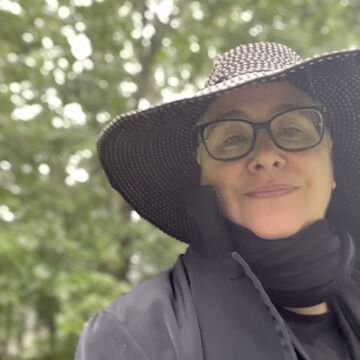

Jenny Magnus
Lecturer
Contact
Bio
Jenny Magnus (she/her) is a writer, performer, musician, director, and teacher who is a founding co-artistic director of the Curious Theater Branch, an all-original theater company, now entering it’s 36th year, author/creator of plays that have been produced at Steppenwolf Theater, at the Museum of Contemporary Art in Chicago, at Chicago Dramatists, at the former Lunar Cabaret, the Prop Thtr and on tour throughout America and Europe. She was a long-time member of the band Maestro Subgum and the Whole and made multiple records with them, as well as three solo recorded CDs, has a current band called The Crooked Mouth, and is represented and distributed by UvuLittle Recordings. In addition to running the Curious Theater Branch and making her own work, she has been teaching in the Writing Program at The School of The Art Institute of Chicago for over 20 years. Jenny Magnus was a long-time adjunct faculty member with Columbia College Chicago, in both the graduate Interdisciplinary Arts Department and the undergraduate Interactive Arts and Media Department. She has taught at The University of Chicago, the Chicago Public Schools, the Metropolitan Correctional Center of Chicago, The University of Illinois, been a Free Street Theater teaching artist, and is sole proprietor of Creative Consulting, a private practice of creativity facilitation. She got her MFA in Writing from the School of the Art Institute of Chicago. Awards: 2024 Artists Support Grant from Dramatists Guild; 2024 Faculty Enrichment Grant from the School of the Art Institute of Chicago; Individual Artist Support, 2022, Media Arts Illinois Arts Council; 2021 Cultural Workers Program Grant, Allies for Community Business; 2018–19 Project Support Grant from Illinois Arts Council; wrote and managed all grants for The Curious Theatre Branch 1988–2006; 1998 Illinois Arts Fellowship Grant in Interdisciplinary Arts; inducted into Hall of Fame at Kettle Moraine High School 2006; included on “Best of Chicago Theater” lists New City Chicago 1997–2011; included among “Artists of the Year” by Chicago Tribune with collaborator Beau O’Reilly 1998. Publications: Curious Plays (inclusion Salvagers), JackLeg Press, 2022; They Don’t Allow Candy in Their Home (story), Jet Fuel Review, 2021; How Not To Be A Wendy (story), Oyez Review, 2019; Observations of an Orchestrated Catastrophe: Plays and Performances, JackLeg Press, 2014/2021 reprint; Robert (video excerpt), Requited online journal, 2013; excerpts from How to Carry Love, Eleven Eleven, California College of the Arts, 2013.
Personal Statement
I am an interdisciplinary artist who brings composition, intention, rhythm, dynamics, and inventiveness to every form of making she encounters. I have created hybrid forms of performance, music, images, and philosophy in my explorations and meditations about awareness, attention, and the performative moment, riding a shifting line between singing and speaking, talking about thinking and thinking about talking, and live and mediated images. My intrepid curiosity about being present in front of people has also lead to an active teaching career, in which I bring a conscious intention to challenge students of whatever age or situation to see themselves as the authors of their own education, striving for excellence in their attention and intention. I am primarily interested in provoking myself and others to look more closely, listen more thoughtfully, and participate in explosive inquiry whenever possible.
I am a practitioner, not a scholar. However, I have been practicing being a teacher for a good long while. My teaching philosophy is based around John Dewey’s ideas of experiential learning, the Socratic method of asking questions, bell hooks’ ideas that the classroom can be a place of liberation, and Paolo Freire’s ideas of an ethical relationship between instructor and student, where powerful hierarchies and systems are made explicit, and the focus is on teaching the student, and not the subject. I utilize a seminar construct, in which all participants are teachers/learners, including myself. I strongly believe in being a “difficultator”, Freire’s word for someone who takes responsibility for tolerating discomfort and awkwardness, because most of the exciting things of the world come out of friction, difficulties, and turbulence.